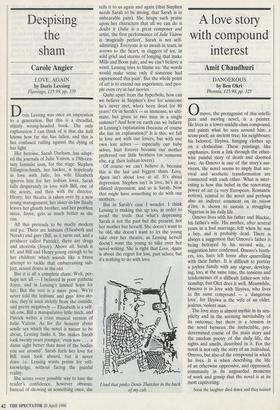Despising the sham
Carole Angier
LOVE, AGAIN by Doris Lessing Flamingo, £15.99, pp. 339 Doris Lessing was once an inspiration to a generation. But this is a dreadful, utterly wrong-headed book. The only explanation I can think of is that she half knows how far she has fallen, and this is her confused railing against the dying of her light.
Her heroine, Sarah Durham, has adapt- ed the journals of Julie Vairon, a 19th-cen- tury feminist icon, for the stage. Stephen Ellington-Smith, her backer, is hopelessly in love with Julie; his wife Elizabeth ignores him for her lesbian lover. Sarah falls desperately in love with Bill, one of the actors, and then with the director, Henry; her theatre is taken over by a new young management; her sister-in-law finally leaves her ghastly brother, and her problem niece, Joyce, gets as much better as she can.
All this pretends to be madly modern and p.c. There are lesbians (Elizabeth and Norah) and gays (Bill, as it turns out, and a producer called Patrick); there are drugs and anorexia (Joyce). Above all, Sarah is 65, and Bill and Henry young enough to be her children: which sounds like a brave attempt to tackle that embarrassing sub- ject, sexual desire in the old.
But it is all a complete sham. Well, per- haps not all — I believed in poor pathetic Joyce, and in Lessing's limited hope for her. But the rest is a mere pose. We're never told the lesbians' and gays' love sto- ries; they're seen strictly from the outside, and pretty negatively — Elizabeth is a self- ish cow, Bill a manipulative little bitch, and Patrick writes a crass musical version of Julie Vairon. As for the honesty about senile sex which the novel is meant to be about, Lessing funks it. She makes Sarah look twenty years younger, 'even now . . . a damn sight better than most of the bodies you see around'. Sarah feels her love for Bill must look absurd, but it never does: i.e. Lessing wants points for self- knowledge, without facing the painful reality.
She seizes every possible way to lose the reader's confidence, however obvious. Instead of showing us something once, she tells it to us again and again (that Stephen needs Sarah to be strong, that Sarah is in unbearable pain). She heaps such praise upon her characters that all we can do is doubt it (Julie is a great composer and artist, the first performance of Julie Vairon is 'magically perfect', Sarah is not self- admiring). Everyone is so awash in tears, in arrows to the heart, in daggers of ice, in wild grief and storms of longing that make Mills and Boon pale, and we can't believe a word. Lessing tries to blame us: 'the words would make sense only if someone had experienced this pain'. But the whole point of art is to extend our experience, and peo- ple even cry at bad movies.
Quite apart from the hyperbole, how can we believe in Stephen's love for someone he's never met, who's been dead for 80 years? Or in Sarah's — so immense, so ulti- mate, but given to two men in a single summer? And how on earth can we believe in Lessing's explanation (because of course she has an explanation)? It is this: we fall in love not with our lovers, but with our own lost selves — especially our baby selves, hurt forever because our mother preferred our little brothers (or someone else, e.g. their lesbian lovers).
Of course we can't believe it, because this is the last and biggest sham. Love, Again isn't about love at all. It's about depression. Stephen isn't in love, he's in a clinical depression; and so is Sarah. Now that might have something to do with our mothers.
But in Sarah's case I wonder. I think Lessing is making this up too, in order to avoid the truth: that what's depressing Sarah is not the past but the present, not her mother but herself. She doesn't want to be old, she doesn't want to let the young take over her theatre, as Lessing herself doesn't want the young to take over her novel-writing. She is right that Love, Again is about the regret for lost, past selves; but it's nothing to do with love.
I had that pinko Denis Thatcher in the back of my cab.. .


































































 Previous page
Previous page